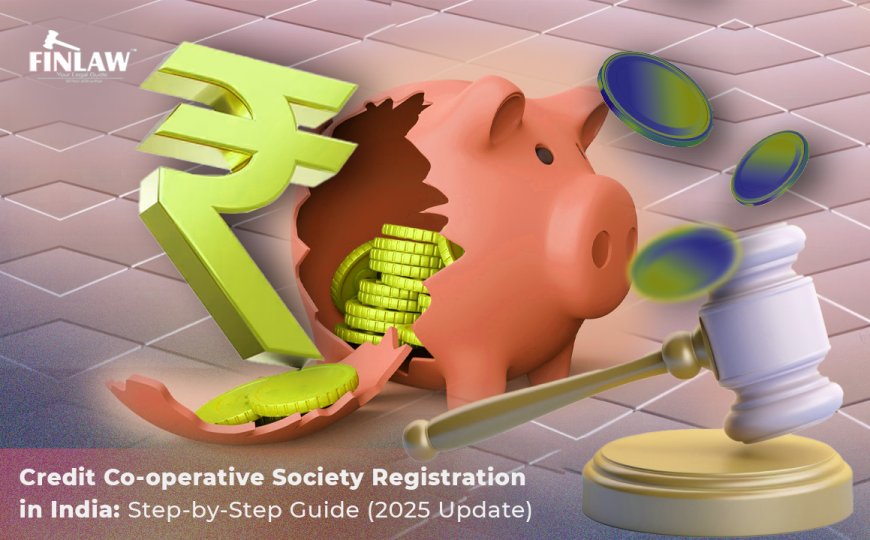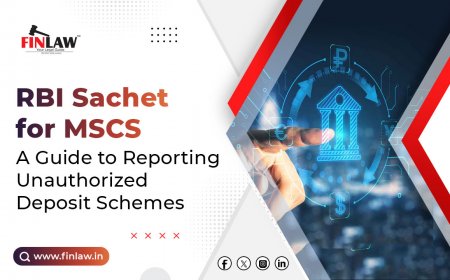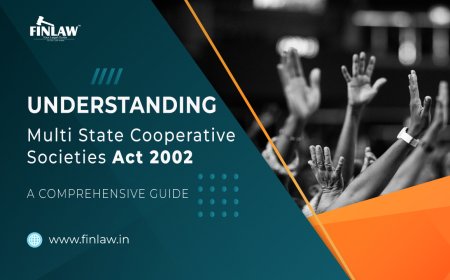Credit Co-operative Society Registration in India: Step-by-Step Guide (2025 Update)
Step-by-step guide to credit co-operative society registration in India. Learn eligibility, documents, legal process, and 2025 updates.

Introduction
In India, credit co-operative societies serve as vital grassroots financial institutions, especially in rural and semi-urban areas. These societies are built on the principle of mutual assistance and operate with the objective of providing affordable credit to their members. Unlike commercial banks, credit co-operative societies are run by and for their members.
If you're considering starting a credit co-operative society in 2025, understanding the latest legal, procedural, and compliance requirements is essential. This detailed guide outlines every step involved in the credit co operative society registration process in India, including documentation, eligibility, compliance, and recent regulatory updates.
What is a Credit Co-operative Society?
A credit co-operative society is a member-driven financial organization that accepts deposits and lends money primarily to its members. It operates as a not-for-profit entity where any profits made are reinvested into the society or used for member welfare.
Credit co-operative societies are commonly formed by individuals sharing a common interest—such as farmers, artisans, small traders, or residents of the same locality—who come together to create a self-sustaining credit mechanism.
Legal Framework for Credit Co-operative Societies in India
Credit co-operative societies in India are governed under two main legal frameworks, depending on their geographical scope:
-
State Credit Co-operative Societies: Registered under the respective State Co-operative Societies Act.
-
Multi-State Credit Co-operative Societies: Registered under the Multi-State Co-operative Societies Act, 2002 and regulated by the Central Registrar.
The Registrar of Co-operative Societies (RCS) in each state or the Central Registrar under the Ministry of Cooperation oversees their registration and compliance.
Why Register a Credit Co-operative Society?
Registering a credit co-operative society provides several advantages:
-
Legal recognition: Enables the society to function as a legal entity capable of owning property, entering contracts, and undertaking financial operations.
-
Access to credit and savings: Offers affordable loans and encourages savings among members.
-
Government benefits: Eligibility for schemes, grants, and assistance from NABARD and cooperative development programs.
-
Tax exemptions: Certain societies enjoy tax benefits under Section 80P of the Income Tax Act.
-
Community empowerment: Promotes financial independence and cooperation among marginalized groups.
Types of Credit Co-operative Societies
|
Type |
Jurisdiction |
Governing Authority |
|
State-Level Credit Co-operative Society |
Within one state |
State Registrar of Co-operative Societies |
|
Multi-State Credit Co-operative Society |
Across two or more states |
Central Registrar, Ministry of Cooperation |
Eligibility Criteria
For State-Level Credit Co-operative Society
-
Minimum 10 members, all of whom must reside in the same state.
-
Members must be 18 years or older.
-
A shared economic objective or common interest among members.
-
Registered office within the state.
For Multi-State Credit Co-operative Society
-
Minimum 50 members from each of at least two states.
-
All members must be Indian citizens.
-
A well-defined objective indicating inter-state operations.
-
Proof of the registered office and financial feasibility.
Step-by-Step Process for Credit Co-operative Society Registration (2025)
A. State-Level Credit Co-operative Society Registration
-
Formation of Promoter Group
Identify at least 10 eligible individuals with a shared objective. Elect a Chief Promoter to lead the registration process.
-
Name Reservation
Apply to the State Registrar to reserve a unique name for the proposed society.
-
Drafting of Bye-laws
Prepare the society’s bye-laws outlining its objectives, governance structure, financial framework, membership criteria, and dispute resolution mechanisms.
-
Opening a Bank Account
Open a bank account in the proposed name of the society and deposit the minimum required share capital.
-
Submission of Application
Submit the application along with the following documents:
-
Form A (or applicable state form)
-
Four copies of the proposed bye-laws
-
Affidavit from promoters
-
Proof of share capital deposit
-
Address proof of the registered office
-
Identity and residence proofs of members
-
Verification by Registrar
The Registrar may conduct an inspection or request additional details.
-
Issuance of Registration Certificate
Upon successful verification, the society is issued a Certificate of Registration, officially recognizing its legal status.
B. Multi-State Credit Co-operative Society Registration
-
Formation of Promoter Group
Assemble a minimum of 50 members from each of two different states and elect a Chief Promoter.
-
Name Approval
Apply to the Central Registrar in New Delhi for name reservation.
-
Preparation of Bye-laws
Draft comprehensive bye-laws in accordance with the Multi-State Co-operative Societies Act, 2002.
-
Submission of Documents
Prepare and submit:
-
Form I (application for registration)
-
Four copies of bye-laws
-
List of promoter members with signatures
-
Address and identity proofs of members
-
Bank certificate for share capital
-
Feasibility report and business plan
-
Proof of registered office address
-
Review and Clarification
The Central Registrar reviews all documents and may seek clarification or modifications to the bye-laws.
-
Certificate of Registration
If all conditions are met, a Certificate of Incorporation is issued, officially registering the multi-state credit co-operative society.
List of Required Documents
|
Document |
Purpose |
|
Application Form (Form A/I) |
Official application for registration |
|
Bye-laws (4 copies) |
Governance and operational framework |
|
Member List |
Details of promoter members |
|
Identity and Address Proofs |
Verification of individual promoters |
|
Share Capital Deposit Proof |
Bank certificate showing fund deposit |
|
Registered Office Proof |
Rent agreement, NOC, or utility bills |
|
Affidavits from Promoters |
Declaration of no criminal background or conflict of interest |
Post-Registration Compliance
Once registered, the society must fulfill the following compliance requirements:
-
PAN and TAN: Obtain from the Income Tax Department.
-
GST Registration: If applicable, especially if services are provided for a fee.
-
Banking Operations: Maintain accurate financial records and books of accounts.
-
Annual Audits: Conduct by an approved co-operative auditor.
-
General Meetings: Hold Annual General Meetings (AGMs) and submit minutes to the Registrar.
-
Returns and Reports: File annual financial reports and member updates.
Government Reforms and Updates (2025)
In 2025, the Government of India introduced key reforms to strengthen the cooperative sector:
-
Digital Co-operative Registration Portals: State-level and central portals are now operational in most regions, reducing paperwork and speeding up approvals.
-
Model Bye-laws Framework: A uniform model for drafting bye-laws has been issued to reduce registration delays.
-
Increased NABARD Support: More funding and training opportunities for registered societies.
-
Ease of Doing Business Measures: The timeline for society registration has been reduced to 60–90 days in most states.
Common Mistakes to Avoid
-
Submitting incomplete or inaccurate documents.
-
Selecting a society name that closely resembles an existing one.
-
Failing to demonstrate the common economic objective.
-
Bypassing post-registration compliance like audits and meetings.
-
Assuming a credit co-operative society has the same powers as a bank (e.g., accepting public deposits).
Registration Fees (Indicative)
|
Item |
Estimated Cost (INR) |
|
Name Reservation |
₹500 – ₹1,000 |
|
Registration Fee |
₹2,000 – ₹10,000 |
|
Legal Consultancy (optional) |
₹15,000 – ₹50,000 |
|
Documentation & Notarization |
₹2,000 – ₹5,000 |
Fees may vary depending on the type of society, legal assistance, and the number of states involved.
Frequently Asked Questions (FAQs)
Can a credit co-operative society operate like a bank?
No. A credit co-operative society cannot accept deposits from the public or perform banking activities unless licensed by the Reserve Bank of India (RBI).
How long does the registration process take?
Typically, 2 to 6 months depending on the type of society and completeness of the documents.
Can foreigners be members of a credit co-operative society?
No. Only Indian citizens are eligible to become members.
What is the minimum capital requirement?
There is no fixed amount, but adequate capital must be shown to ensure operational viability and meet the objectives.
Conclusion
Registering a credit co-operative society in India is a meaningful way to promote financial inclusion and empower communities. Whether you aim to serve a local area or operate across states, it is essential to follow the proper legal process and maintain compliance post-registration.
With ongoing reforms, digitized processes, and government incentives, 2025 is a promising time to launch a credit co-operative society. However, legal complexities can arise, so it is advisable to consult professionals experienced in cooperative law.
What's Your Reaction?



















